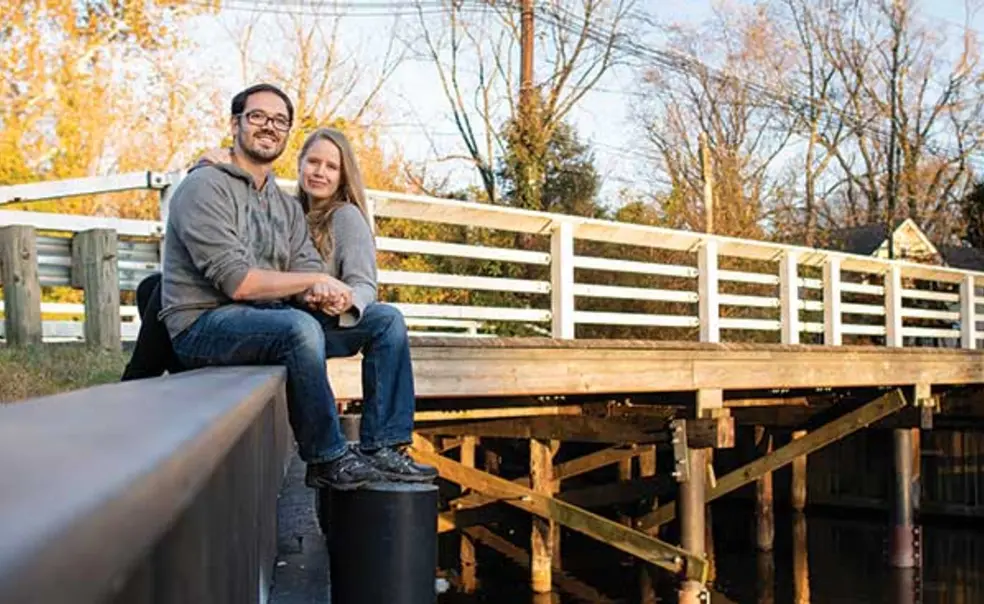Darren Geist ’05: As Luck Would Have It
A fortuitous set of circumstances, selfless instincts, and fast thinking end in a heroic rescue
It could have been a scene from a movie: After midnight, there’s an unexplained noise followed by a crash on a deserted road. Our hero emerges from his home to investigate, but sees nothing. Then he hears muffled cries and discovers a car almost submerged in a nearby canal. He jumps in and pulls out the driver as the vehicle slips below the water’s surface.
That describes what happened to Darren Geist ’05 June 19, when he rescued a 27-year-old medical student whose car had plunged into New Jersey’s Delaware and Raritan Canal.
For his bravery, Geist, the father of two, has been nominated for three awards — including the Carnegie Medal, given in the United States and Canada to those “who risk their lives to an extraordinary degree while saving or attempting to save the lives of others.”
Geist “is deserving of any accolades,” says Lt. Joseph Lech of the Lawrence Township Police Department, which nominated Geist for its annual Citizen Lifesaving Award. “Not being trained and without special equipment, what he did was really heroic.”
In addition, Geist, an attorney for Colgate-Palmolive, is up for the Chairman’s Global “You Can Make a Difference” Award, given to employees who make a commitment to their communities, among other contributions.
Geist and his wife, Lauren, recall hearing a “weird” noise after going to bed around midnight. Failing to find anything amiss in their home, they went back upstairs but almost immediately heard screeching and a crash. The couple’s house is close to a sharp curve on a narrow road where a bridge crosses the D&R Canal, not far from Princeton’s campus.
Outside, Geist heard faint cries that got louder as he neared the canal. With light only from his cellphone, he saw little until he crossed the bridge and glimpsed the car, mostly under water.
The vehicle was under the bridge with its passenger side pinned against a support rail. Only about a foot of the car was above water, and inside the driver was screaming for help.
Yelling for Lauren to call 911, Geist held on to a pillar and swung himself into the water. Making his way to the car, about 10 feet away, he pulled at the back door. It didn’t budge. He tried the driver’s door — and it opened. Propping the door with one arm while calling, “The front door is open!” Geist pulled the student’s arm, helping him exit.
Only about a foot of the car was above water, and inside, the driver was screaming for help.
Geist later said he didn’t wait for the police because could tell by the driver’s screams that he was going to die. By the time the two men climbed out of the canal, police had arrived and the entire car was under water.
According to Lech, the canal was almost at flood stage due to heavy rains and had a faster-than-normal current. Geist doesn’t remember many details of the rescue, explaining that he was “completely pumped on adrenaline. The water wasn’t cold,” he recalls, “but I was shaking when I got out.”
The couple marvel at the fortuitous circumstances surrounding the rescue. “There were so many weird things — the sound that got us up, so we already were awake; the fact we got out in time; and that the car door opened,” Geist says. “And I was supposed to be in Canada for work that night, but my flight was canceled.”
The medical student has visited the couple and wrote Geist a letter calling him his guardian angel.
Does Geist, who received a Spirit of Princeton award in 2005 for founding a project that addressed issues of child soldiers and genocide, feel like a hero?
“I don’t look at it as ‘I’m such a hero’ but that I’m so lucky,” he says. “All the things that had to go right. ... I feel lucky and blessed it worked out the way it did.”












1 Response
Henry Milligan ’81
6 Years AgoMaking a Difference
Re “As Luck Would Have It” (Princetonians, Dec. 4): A simply amazing story! To Darren Geist ’05, I would say: Yes, you were in the right spot; and yes, your flight was canceled; and yes, you heard a strange sound before the crash — but you took action, and that was the difference! Everyone, including Princeton, is proud of you!